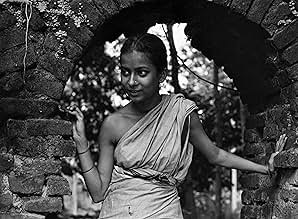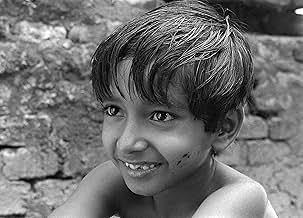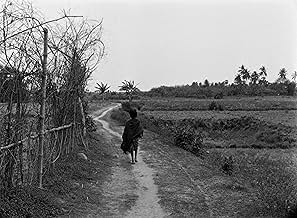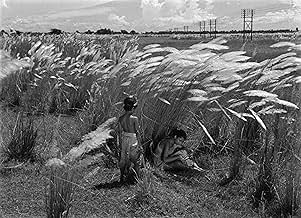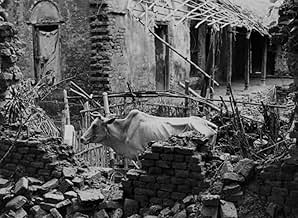IMDb RATING
8.2/10
41K
YOUR RATING
Impoverished priest Harihar Ray, dreaming of a better life for himself and his family, leaves his rural Bengal village in search of work.Impoverished priest Harihar Ray, dreaming of a better life for himself and his family, leaves his rural Bengal village in search of work.Impoverished priest Harihar Ray, dreaming of a better life for himself and his family, leaves his rural Bengal village in search of work.
- Director
- Writers
- Stars
- Nominated for 1 BAFTA Award
- 11 wins & 3 nominations total
Kanu Bannerjee
- Harihar Ray
- (as Kanu Bandyopadhyay)
Karuna Bannerjee
- Sarbojaya Ray
- (as Karuna Bandopadhyay)
Subir Banerjee
- Apu Ray
- (as Subir Bandopadhyay)
Uma Das Gupta
- Durga
- (as Uma Dasgupta)
Runki Banerjee
- Little Durga
- (as Runki Bandopadhyay)
Haren Banerjee
- Chinibas, Sweet-seller
- (as Haren Bandyopadhyay)
Roma Ganguli
- Roma
- (as Rama Gangopadhyay)
Binoy Mukherjee
- Baidyanath Majumdar
- (as Binoy Mukhopadhyay)
- Director
- Writers
- All cast & crew
- Production, box office & more at IMDbPro
Featured reviews
"Pather Panchali", Satyajit Ray's debut film about life in a Bengali village, was the first movie from India to gain wide recognition and acclaim in the west. It is an affecting story of a rural family struggling to deal with poverty and tragedy in their ancestral home. Ray adapted the script from Bibhuti Bihushaw Banerjee's semi-autobiographical novel of the same title and retells it with natural beauty and a quiet perspective. The filmmaker, who came from a literary and artistic background(He was a product of the Indian Renaissance) was interested in the contemporary problems of his country-and he shared with the Neorealist films from Italy- a simple and direct approach to making movies. Ray created ordinary scenes that were incredibly life-like. His films contained very few strains of artifice. He believed that the raw material of cinema was life itself. Ray generally concentrated on small subjects and ordinary people. He favored using non-actors and shooting on location to heighten the realism. He made films in his own style; dignified and subtle; sincere and with a conscience. In "Pather Panchali" (Song of the Little Road") Ray makes superb use of his milieu. The viewer immediately feels the cramped conditions of the families' decaying house and the open-air confines of the surrounding forest. When Ray sends his camera beyond the village, the observer can sense the allure and freedom of the vast fields that spring immodestly from a thin, winding trail. Rays' was a cinema of thought and feeling, in which emotion was deliberately restrained because it is so strong. This restraint adds to the psychological intensity in his work. Nearly all of his films are marked by this remarkable depth of feeling. "Pather Panchali", the first installment of the Apu Trilogy("Aparajito" and "The World of Apu" would follow) depicts a young boy (Apu) exploring his ever-expanding universe with a growing sense of wonder. Ray excelled at showing how children and adolescents confront mystery and joy; sadness and death. The director shows Apu's burgeoning awareness with a masterful use of the long shot. High-angled, distant shots track Apu and his older sister Durga, as they run spiritedly through white-kashed fields. This sense of discovery gives the film it's emotional power. The director's main subject was India-it's customs and culture. It's conflicts between the traditional way of life and the impact and influence of the West. He tried arduously to capture this synthesis between western ideas and traditional Hindu values. His concern for human problems and not issues of national politics gave his films universal appeal. "Pather Panchali" delineates the small joys and acute sorrows of a poor Indian family. It is an endearing testament that poverty does not nullify love and that even the most afflicted person can find some modest pleasures in their world. The film's indigenous sound track is vital to Ray's story of ancestral limitations. Twanging ektaras, wailing tarshehnais and six-stringed sitars resound liberally throughout the movie. It would be difficult to imagine "Pather Panchali" without it's memorable score. Satyajit Ray was an unpretentious filmmaker. He was genuinely uninterested in commercial considerations. His films were life-affirming, authentic and honest; gentle and poetic- truthful observations on human behavior that employed simple but strong themes. Ray's unadorned style of film-making was intimate, probing, and revealing. (Possible spoiler) The final scene shows the grieving family leaving their home in an ox-driven carriage to begin a new life. A trailing camera in medium close-up captures a compelling mixture of emotions on their faces. Expressions of pain and resolution; hope and despair; the future and the past. A seemingly simple yet unmistakably powerful scene that typifies Satyajit Ray's profound cinema. A cinema of gentle but deep observation, understanding and unabashed love of the human race.
I don't know how even 6.4% of the female voters could have given this movie a 2!!!!! This was Ray's first movie, but his economy of dialog, his synchronization and sympathy with India's rural life is incredible. So little said, yet so much! Apu and Durga following the sweetmeat seller, the scene where they run through a "kash" field....superb, the work of a real artist, a master. The film develops its characters and the atmosphere slowly and resolutely. The narrative builds up to a powerful climax. Ray had an ancient camera while shooting this movie, did it matter? No. His expression and technique was more than sound, although this was a maiden venture.
Some critics found(and still find, I might add) the film to be too slow. Satyajit Ray wrote about the slow pace - "The cinematic material dictated a style to me, a very slow rhythm determined by nature, the landscape, the country. The script had to retain some of the rambling quality of the novel because that in itself contained a clue to the authenticity: life in a poor Bengali village does ramble."
There you are, if you have not watched this movie, you'll probably missed the greatest movie made on Indian rural life. That's why Akira Kurosawa said of him:"To have not seen the films of Ray is to have lived in the world without ever having seen the moon and the sun"
Some critics found(and still find, I might add) the film to be too slow. Satyajit Ray wrote about the slow pace - "The cinematic material dictated a style to me, a very slow rhythm determined by nature, the landscape, the country. The script had to retain some of the rambling quality of the novel because that in itself contained a clue to the authenticity: life in a poor Bengali village does ramble."
There you are, if you have not watched this movie, you'll probably missed the greatest movie made on Indian rural life. That's why Akira Kurosawa said of him:"To have not seen the films of Ray is to have lived in the world without ever having seen the moon and the sun"
What a wonderful film. For those who have not watched any films from India or heard of Ray, I strongly recommend it. Full of sadness, hope, innocence, and despair, it is an emotionally evocative portrait of the life of an Indian family, their trials, and their courage and persistence throughout. They go on, not because they are exceptional, but because they must, because they are human.
Ray does a masterful job of capturing the simple joys of childhood, and the ambitions and dreams which make us all human, regardless of where we are. Simple scenes such as a disfigured elderly woman seated on a porch, singing of her approaching death, are very moving. I have never seen the basic elements of life treated with such an incisive yet soft touch as Ray has in this film. It is wonderful to watch in comparison to the broad writing strokes and vulgar generalities of most directing and writing today. At the risk of sounding trite, this is a film which is not merely entertainment or art, but one which reaches into your heart and makes a place for itself there. It belongs there.
Ray does a masterful job of capturing the simple joys of childhood, and the ambitions and dreams which make us all human, regardless of where we are. Simple scenes such as a disfigured elderly woman seated on a porch, singing of her approaching death, are very moving. I have never seen the basic elements of life treated with such an incisive yet soft touch as Ray has in this film. It is wonderful to watch in comparison to the broad writing strokes and vulgar generalities of most directing and writing today. At the risk of sounding trite, this is a film which is not merely entertainment or art, but one which reaches into your heart and makes a place for itself there. It belongs there.
10ballweg
I originally saw the Apu trilogy in 1961 in a little theater in Berkley. Sat through a straight showing of all three films and walked out after six hours in awe. It was a defining day in the development of an avid film buff. I have waited three years for the DVDs to be released, and hoped against hope that Criterion would get the rights, but it was not to be. Sony has released an unadorned, Mirchant and Ivory Foundation restoration: but they are finally available. I bought all three of the Trilogy the day they were released, but have been reluctant to put them on. So many of my memories of "great" films have made me wonder what I was on when I saw it to think that was great. Think "Brewster McCloud." My experience of Pather Panchali and the full trilogy was a memory I didn't want diminished in any way. Tonight I came home from work, put the Pather Panchali in and sat totally rapt for the full two hours. The DVD production values and the print quality are really bad in spots, but all that fades as one of the really great art films takes over, and the immersion in the lives behind the film works its magic. Film doesn't have to be an act of corporate commerce: Pather Panchali is living proof that film can be a medium of great art.
I have just finished Pather Panchali. To be honest, it took almost two weeks to watch it. Not only interruptions, but the shear poverty of the individuals--the family--is overwhelming. Each member exhibits their poverty and destitution in a different way. My favorite character is Durga, who gives and gives until she reaches the point where she is tired of not receiving.
I will forever remember this movie, and I hope to watch the other two parts of the trilogy.
I have to have this film in my collection. Movies that make you think and think again, and search your heart for answers that sometimes never come.
I will forever remember this movie, and I hope to watch the other two parts of the trilogy.
I have to have this film in my collection. Movies that make you think and think again, and search your heart for answers that sometimes never come.
Did you know
- TriviaHalfway through filming, Ray ran out of funds. The Government of West Bengal loaned him the rest, allowing him to complete the film. This loan is listed in public records at the time as "roads improvement", a nod to the film's translated title.
- GoofsAlthough the film is set in early 20th-century rural India (a time in which public health campaigns presumably did not exist), when Apu and Durga are shown hiding in the fields waiting to catch a glimpse of the train, a vaccination mark is clearly visible on the right arm of Uma Das Gupta, who portrays Durga.
- Alternate versionsThere is an Italian edition of this film on DVD, re-edited with the contribution of film historian Riccardo Cusin. This version is also available for streaming on some platforms.
- ConnectionsFeatured in Century of Cinema: 100 ans de cinéma: 100 ans de cinéma indien (1996)
- How long is Pather Panchali?Powered by Alexa
Details
- Release date
- Country of origin
- Official site
- Language
- Also known as
- Pather Panchali
- Filming locations
- Boral, West Bengal, India(entire movie)
- Production company
- See more company credits at IMDbPro
Box office
- Gross US & Canada
- $134,241
- Opening weekend US & Canada
- $16,064
- May 10, 2015
- Gross worldwide
- $135,342
- Runtime
- 2h 5m(125 min)
- Color
- Aspect ratio
- 1.37 : 1
Contribute to this page
Suggest an edit or add missing content


